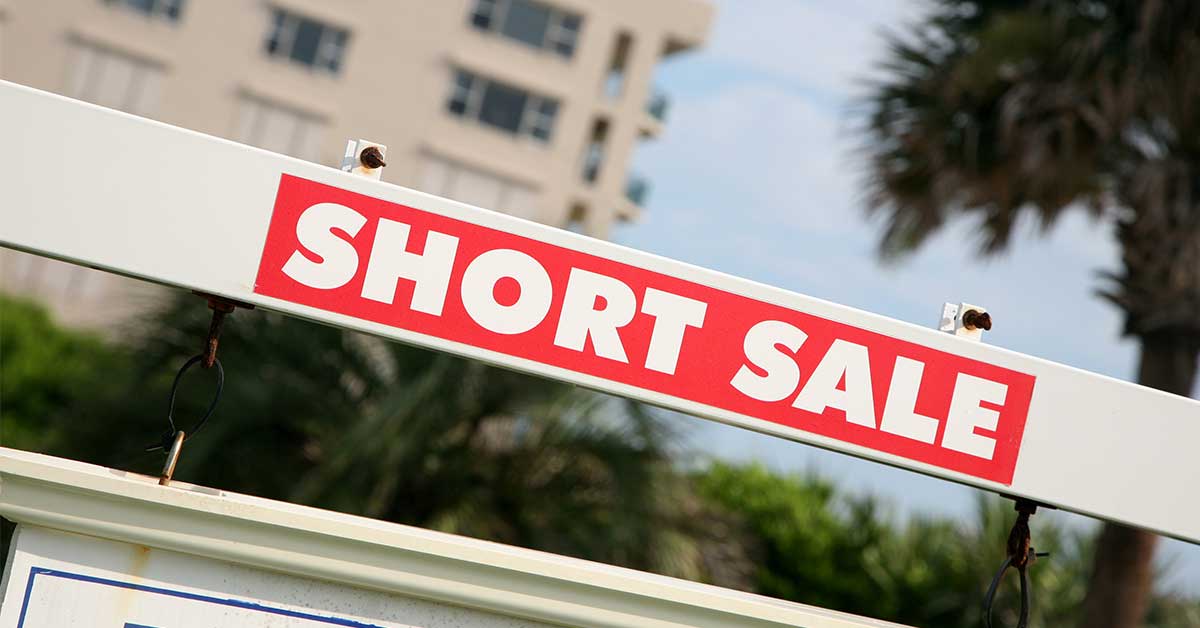A short sale is when when the proceeds from the sale of a home are less than what the sellers still owe on the property. In other words, the sale is “short” of enough money to release the homeowners from the existing mortgage debt. This has become a fairly common scenario in recent times.
Short sales have to go through a special process and review by the bank who holds the mortgage, as it’s being asked to accept a lower amount than what the seller originally borrowed. Sometimes, the sellers still have to pay back some or all of the difference over time; other times, they’re released from the deficient amount.
Short Sales in Florida
The typical short sale process in Florida takes 3 to 9 months, so plan for at least 6 months. If a buyer decides to purchase a short sale, the contract will almost always be an “as is” contract, and no repairs will be made to the home. The buyer also signs a Short Sale Addendum,giving the seller typically between 90 to 120 days to get the short sale approved. If approval isn’t received within this time, the buyer can choose to extend the contract or cancel and get their deposit back.
Short Sale Approval Process
After the seller accepts a contract from the buyer to purchase the home, the contract is submitted to the lender that holds the mortgage. Then there’s a waiting period for the buyers and sellers. The lender assigns a negotiator who reviews the seller’s financial data and determines if the seller has had a hardship and if they will approve a short sale. The bank has its own appraisals completed on the property, called BPOs (Broker’s Priced Opinions) to make sure it’s getting fair market value for the home. Sometimes the bank counters the amount it will accept, so the price isn’t determined by the seller in the end.
After Short Sale Approval
Once the seller’s lender determines the amount it will accept, it issues a short sale approval letter. This letter either provides the approved price that’s also the contract price, or it provides an approval at a higher price. With the latter, the buyer must increase their purchase price to the amount the bank requires for the sale to take place. Once the letter is issued and the buyer agrees to the price, the buyer completes their inspections and appraisal if needed. If the buyer isn’t satisfied with the inspections, they still have the option to cancel the contract and their deposit is returned as long as it’s within the Buyer’s inspection period and the contract specifies this clause.
Sometimes, the bank wants the seller to contribute cash at closing. In such cases, sellers may walk away and just let the bank foreclose, and the home sale contract is canceled. It doesn’t happen often, but it does happen, so short sales aren’t always a sure thing.
Is It Worth the Wait?
If a buyer will wait at least 6 months for the transaction to occur and is OK with the prospect of it not working out, a short sale would be a good option. For buyers that don’t have to move right away and love the home, it may be worth the time and uncertainty. Also, they may be good options for investors or people buying a second home.
Unfortunately, most lenders will not even begin the short sale process until they have a contract on the property, and thus you don’t know in advance what price the bank will accept. Short sales are a waiting game, requiring patience since there’s no way to speed up the bank’s decision-making process.
Every short sale time frame is unique and depends on many factors, such as the seller’s circumstances, amount of loans on the property, and the lender’s staffing. Again, they typically take anywhere from 3 to 9 months, but most are closer to 6 months; however, they can also sometimes extend a little beyond 9 months.
Closing generally occurs 30 to 45 days after the bank agrees to the short sale price, once the buyer is approved for a loan. There’s a time limit on how long the short sale approval letter is valid.
Is It Smart to Buy a Short Sale Home?
Buying a property through a short sale may be a good deal, but not necessarily. Recently, banks have been countering at a much higher price than expected. The lenders want fair market value for the properties, so most end up not being good deals. Of course, investors don’t have anything to lose by waiting, because they might get a good price; but again, the bank usually counters, making many transactions not such great deals.
There isn’t any guarantee the bank will accept the purchase price on the contract, nor the list price of the property. Sometimes, the bank forecloses on the seller and the buyer wasted time hoping things work out. Each lender has its own requirements, criteria, and pricing strategy. The contracts are “as is,” and sometimes the bank asks the seller or buyer to pay past HOA dues or property taxes at closing.
The list price of a short sale is not necessarily the price the bank wants. The final pricing decision is determined by the lender, but this amount isn’t known until the short sale process is nearly complete. Some of those low listings or “too good to be true” listings come back on the market at higher prices once the bank makes a determination.
Bank-owned properties take about 30 to 40 days and short sales about 6 months. With the market recovered, there aren’t nearly as many short sales as before, so the timeline might be quicker. But still there are no guarantees on price or closing date.
Before Making a Short Sale Offer
A short sale holds many potential pitfalls for buyers. Answering these questions will help you determine if a short sale is a good fit for you.
Are you patient?
After you come to agreement with the seller to buy a short sale property, the seller’s lender (or lenders if there’s more than one mortgage) still has to approve the sale price. This can take several months. If you make an offer tremendously lower than the fair market value of the home, the lender could make a counteroffer, which will lengthen the process.
Is your financing in order?
Lenders like cash offers. But even if you can’t pay cash, it’s important to show you’re well qualified. If you’re preapproved, have a large down payment, and can close at any time, your offer will be viewed more favorably than that of a buyer whose financing is less secure.
Do you have any contingencies?
Lenders like flexible terms. If you must sell a home before you can close, or you need to be in your new home by a certain time, a short sale may not be for you. Also, you’ll most likely be asked to take the property “as is.” Lenders are already taking a loss on the property and may not agree to requests for repair credits.
Can you take rejection?
Even when a lender approves a short sale, it can require the seller to sign a promissory note to repay the deficient amount of the loan; this may not be acceptable to some financially strapped sellers. Lenders can also change any terms of the contract you negotiated, which may not be agreeable to you.
When Pursuing a Short Sale Home
If you’re serious about purchasing a short sale property, it’s important to have expert assistance. Here are some people you’ll want by your side:
- An experienced real estate attorney who’s knowledgeable about the short sale process increases your chances of getting an approval and helps with your contract
- A title officer should do an initial title search on a short sale property to examine the liens; if there are multiple lien holders (second or third mortgage/lines of credit, real estate tax lien, mechanic’s lien, homeowners association lien, etc.), it’s much harder to get the contract to closing because any of the lien holders could put a kink in the process anywhere along the way
The risks of a short sale are considerable. But if you have the time, patience, and will to see it through, a short sale can be a win-win for you and the sellers.



